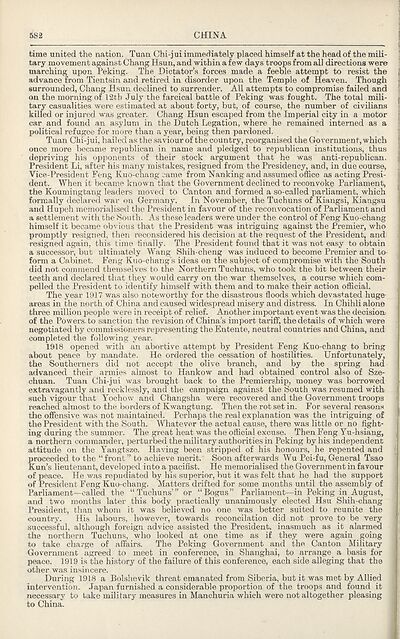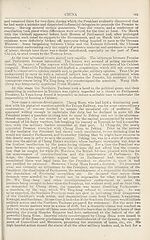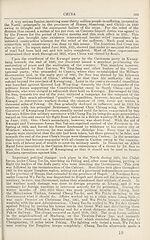1924
(648) Page 582
Download files
Complete book:
Individual page:
Thumbnail gallery: Grid view | List view

582
CHINA
time united the nation. Tuan Chi-j ui immediately placed himself at the head of the mili¬
tary movement against Chang Hsun, and within a few days troops from all directions were
marching upon Peking. The Dictator’s forces made a feeble attempt to resist the
advance from Tientsin and retired in disorder upon the Temple of Heaven. Though
surrounded, Chang Hsun declined to surrender. All attempts to compromise failed and
on the morning of 12th July the farcical battle of Peking was fought. The total mili¬
tary casualities were estimated at about forty, but, of course, the number of civilians
killed or injured was greater. Chang Hsun escaped from the Imperial city in a motor
car and found an asylum in the Dutch Legation, where he remained interned as a
political refugee for more than a year, being then pardoned.
Tuan CM-jui, hailed as the saviour of the country, reorganised the Government, which
once more became republican in name and pledged to republican institutions, thus
depriving his opponents of their stock argument that he was anti-republican.
President Li, after his many mistakes, resigned from the Presidency, and, in due course,
Vice-President Feng Kuo-chang came from Nanking and assumed office as acting Presi¬
dent. When it became known that the Government declined to reconvoke Parliament,
the Koumingtang leaders moved to Canton and formed a so-called parliament, which
formally declared war on Germany. In November, the Tuchuns of Kiangsi, Kiangsu
and Hupeh memorialised the President in favour of the reconvocation of Parliament and
a settlement with the South. As these leaders were under the control of Feng Kuo-chang
himself it became obvious that the President was intriguing against the Premier, who
promptly resigned, then reconsidered his decision at the request of the President, and:
resigned again, this time finally. The President found that it was not easy to obtain
a successor, but ultimately Wang Shih-cheng was induced to become Premier and to-
form a Cabinet. Feng Kuo-chang’s ideas on the subject of compromise with the South
did not commend themselves to the Northern Tuchuns, who took the bit between their
teeth and declared that they would carry on the war themselves, a course which com¬
pelled the President to identify himself with them and to make their action official.
The year 1917 was also noteworthy for the disastrous floods which devastated huge-
areas in the north of China and caused widespread misery and distress. In Chihli alone
three million people were in receipt of relief. Another important event was the decision
of the Powers, to sanction the revision of China’s import tariff, the details of which were
negotiated by commissioners representing the Entente, neutral countries and China, and
completed tile following year.
1918 opened with an abortive attempt by President Feng Kuo-chang to bring
about peace by mandate. He ordered the cessation of hostilities. Unfortunately,
the Southerners did not accept the olive branch, and by the spring had
advanced their armies almost to Hankow and had obtained control also of Sze¬
chuan. Tuan Chi-jui was brought back to the Premiership, money was borrowed
extravagantly and recklessly, and the campaign against the South was resumed with
such vigour that Yochow and Changsha were recovered and the Government troops
reached almost to the borders of Kwangtung. Then the rot set in. For several reasons
the offensive was not maintained. Perhaps the real explanation was the intriguing of
the President with the South. Whatever the actual cause, there was little or no fight¬
ing during the summer. The great heat was the official excuse. Then Feng Yu-hsiang,
a northern commander, perturbed the military authorities in Peking by his independent
attitude on the Yangtsze. Having been stripped of his honours, he repented and
proceeded to the “front” to achieve merit. Soon afterwards Wu Pei-fu, General Tsao
Kun’s lieutenant, developed into a pacifist. He memorialised the Government in favour
of peace. He was repudiated by his superior, but it was felt that he had the support
of President Feng Kuo-chang. Matters drifted for some months until the assembly of
Parliament—called the “Tuchuns’” or “Bogus” Parliament—in Peking in August,
and two months later this body practically unanimously elected Hsu Shih-chang
President, than whom it was believed no one was better suited to reunite the
country. His labours, however, towards reconcilation did not prove to be very
successful, although foreign advice assisted the President, inasmuch as it alarmed
the northern Tuchuns, who looked at one time as if they were again going
to take charge of affairs. The Peking Government and the Canton Military
Government agreed to meet in conference, in Shanghai, to arrange a basis for
peace. 1919 is the history of the failure of this conference, each side alleging that the
other was insincere.
During 1918 a Bolshevik threat emanated from Siberia, but it was met by Allied
intervention. Japan furnished a considerable proportion of the troops and found it
necessary to take military measures in Manchuria which were not altogether pleasing
to China.
CHINA
time united the nation. Tuan Chi-j ui immediately placed himself at the head of the mili¬
tary movement against Chang Hsun, and within a few days troops from all directions were
marching upon Peking. The Dictator’s forces made a feeble attempt to resist the
advance from Tientsin and retired in disorder upon the Temple of Heaven. Though
surrounded, Chang Hsun declined to surrender. All attempts to compromise failed and
on the morning of 12th July the farcical battle of Peking was fought. The total mili¬
tary casualities were estimated at about forty, but, of course, the number of civilians
killed or injured was greater. Chang Hsun escaped from the Imperial city in a motor
car and found an asylum in the Dutch Legation, where he remained interned as a
political refugee for more than a year, being then pardoned.
Tuan CM-jui, hailed as the saviour of the country, reorganised the Government, which
once more became republican in name and pledged to republican institutions, thus
depriving his opponents of their stock argument that he was anti-republican.
President Li, after his many mistakes, resigned from the Presidency, and, in due course,
Vice-President Feng Kuo-chang came from Nanking and assumed office as acting Presi¬
dent. When it became known that the Government declined to reconvoke Parliament,
the Koumingtang leaders moved to Canton and formed a so-called parliament, which
formally declared war on Germany. In November, the Tuchuns of Kiangsi, Kiangsu
and Hupeh memorialised the President in favour of the reconvocation of Parliament and
a settlement with the South. As these leaders were under the control of Feng Kuo-chang
himself it became obvious that the President was intriguing against the Premier, who
promptly resigned, then reconsidered his decision at the request of the President, and:
resigned again, this time finally. The President found that it was not easy to obtain
a successor, but ultimately Wang Shih-cheng was induced to become Premier and to-
form a Cabinet. Feng Kuo-chang’s ideas on the subject of compromise with the South
did not commend themselves to the Northern Tuchuns, who took the bit between their
teeth and declared that they would carry on the war themselves, a course which com¬
pelled the President to identify himself with them and to make their action official.
The year 1917 was also noteworthy for the disastrous floods which devastated huge-
areas in the north of China and caused widespread misery and distress. In Chihli alone
three million people were in receipt of relief. Another important event was the decision
of the Powers, to sanction the revision of China’s import tariff, the details of which were
negotiated by commissioners representing the Entente, neutral countries and China, and
completed tile following year.
1918 opened with an abortive attempt by President Feng Kuo-chang to bring
about peace by mandate. He ordered the cessation of hostilities. Unfortunately,
the Southerners did not accept the olive branch, and by the spring had
advanced their armies almost to Hankow and had obtained control also of Sze¬
chuan. Tuan Chi-jui was brought back to the Premiership, money was borrowed
extravagantly and recklessly, and the campaign against the South was resumed with
such vigour that Yochow and Changsha were recovered and the Government troops
reached almost to the borders of Kwangtung. Then the rot set in. For several reasons
the offensive was not maintained. Perhaps the real explanation was the intriguing of
the President with the South. Whatever the actual cause, there was little or no fight¬
ing during the summer. The great heat was the official excuse. Then Feng Yu-hsiang,
a northern commander, perturbed the military authorities in Peking by his independent
attitude on the Yangtsze. Having been stripped of his honours, he repented and
proceeded to the “front” to achieve merit. Soon afterwards Wu Pei-fu, General Tsao
Kun’s lieutenant, developed into a pacifist. He memorialised the Government in favour
of peace. He was repudiated by his superior, but it was felt that he had the support
of President Feng Kuo-chang. Matters drifted for some months until the assembly of
Parliament—called the “Tuchuns’” or “Bogus” Parliament—in Peking in August,
and two months later this body practically unanimously elected Hsu Shih-chang
President, than whom it was believed no one was better suited to reunite the
country. His labours, however, towards reconcilation did not prove to be very
successful, although foreign advice assisted the President, inasmuch as it alarmed
the northern Tuchuns, who looked at one time as if they were again going
to take charge of affairs. The Peking Government and the Canton Military
Government agreed to meet in conference, in Shanghai, to arrange a basis for
peace. 1919 is the history of the failure of this conference, each side alleging that the
other was insincere.
During 1918 a Bolshevik threat emanated from Siberia, but it was met by Allied
intervention. Japan furnished a considerable proportion of the troops and found it
necessary to take military measures in Manchuria which were not altogether pleasing
to China.
Set display mode to:
![]() Universal Viewer |
Universal Viewer | ![]() Mirador |
Large image | Transcription
Mirador |
Large image | Transcription
Images and transcriptions on this page, including medium image downloads, may be used under the Creative Commons Attribution 4.0 International Licence unless otherwise stated. ![]()
| Asian directories and chronicles > 1924 > (648) Page 582 |
|---|
| Permanent URL | https://digital.nls.uk/196432307 |
|---|
| Attribution and copyright: |
|
|---|---|
| Description | Volumes from the Asian 'Directory and Chronicle' series covering 1917-1941, but missing 1919 and 1923. Compiled annually from a multiplicity of local sources and research. They provide listings of each country's active corporations, foreign residents and government agencies of all nationalities for that year, together with their addresses. Content includes: various treaties; coverage of conflicts; currencies and taxes; consular fees; weights and measures; public holidays; festivals and traditions. A source of information for both Western states and communities of foreigners living in Asia. Published by Hongkong Daily Press. |
|---|---|
| Shelfmark | H3.86.1303 |
| Additional NLS resources: |

